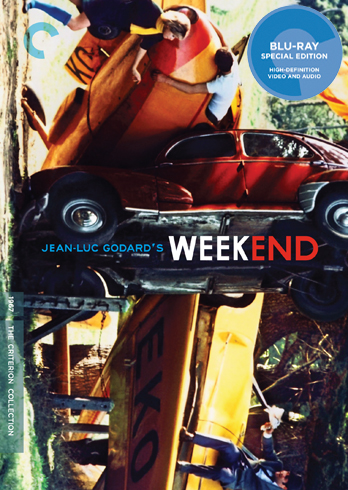
Weekend (The Criterion Collection)
Director - Jean-Luc Godard
Cast - Jean Yanne, Mireille Darc
Country of Origin - France
Discs - 1
Distributor - Criterion
Reviewer - Scott MacDonald
Date - 11/20/12
The Film (5/5)
It seems that in the world of modern filmmaking most filmmakers choose to wear their influences on their proverbial sleeves. You can watch almost any film by Edgar Wright, Quentin Tarantino, Jim Jarmusch, etc, and see their love for various cinematic genres (and in some cases specific films). This is a trend that has not always existed in the film going audience, and can at least in part be attributed to the French New Wave filmmakers and Jean-Luc Godard.
In Godard's earliest feature film Breathless he dedicates the film to Poverty Row Studio Monogram pictures a studio dedicated to cheapy genre action and adventure type movies. The film itself was heavily influenced by the film noir and crime films of the 30's and 40's, only more experimental and subversive. In not a one of those films are you likely to see Bogart and Bacall stopping the action for 15 minutes to have a discussion not directly relating to the plot in her bedroom.
Throughout the 60's Godard continued to make genre subversive feature films each film bore his unique filmmaking stamp. They were adventurous, intellectually stimulating, and had a sense of fun to them. As the 60's went on, however, his features became more political as he became more involved in the modern communist party, this influence can be seen in such features as La Chinoise and Masculin Feminin (Jean-Pierre Leaud's character in the film much like Godard is an active communist). They also become more experimental in style. Now Godard was never one to shy away from cinematic experimentation with Breathless he pioneered the jump cut technique, out of either necessity or the desire for a different creative outlet, but his mid to late 60's fare like Pierrot Le Fou would see more experimental elements and a lesser influence on traditional narratives than his earlier features. This combination of politically influenced feature filmmmaking, and experimental filmmaking would culminate in 1967's Weekend.
Weekend has a very simple story, Corinne(Mireille Darc) and Roland(Jean Yanne) are a married couple that seemed to have a marriage of convenience. Both seem to actively dislike each other, and have relationships outside of said marriage. They are both waiting for Corinne's sick Father to die so they can collect his inheritance, when he does they take a weekend long excursion across the France to collect it, only this isn't a simple road trip film by any means. They end in long, strange traffic jams, and amongst a group of cannibals just to name a few things.
The film plays off like the surrealistic version of a domestic drama. The film begins in the couples apartment, and right away it is understood there is tension between them. This tension is only increased on this extremely strange road trip. This film does not play to what one would consider a typical three act structure, and actually feels like 2 separate and distinct halves of one cohesive whole. The first is a playful, and surreal trip through the French countryside with some of the best visualsa in Godard's oeuvre, while the second half takes on a more political nature with more long dialogue driven passages, that seem to help bring the whole film to a thematic completion.
Godard placed a title card at the end of Weekend stating that this was the end of cinema, and for him for a time this was truly the end of his traditional cinematic career. He would not make another film with what could be considered a semi-traditional narrative until 4 years later with Tout va bien. After this shoot he said goodbye to the crew that had served him well throughout the 60's, as if this was to be his last feature project. It would have been an excellent way to go out, but as it stands more greatness was to come.
Audio/Video (4.5/5)
Jean-Luc Godard's Weekend looks simply glorious on this Blu-ray from the Criterion Collection. The restoration from those folks at Criterion have made this film shine in ways I have never seen it look before. The colors in the film are brighter than they've ever been, there is a nice and strong depth and detail to the image. The flesh tones are accurate, black levels are very deep, and there is a healthy natural layer of film grain throughout the film.
The French LPCM 1.0 track courtesy of Criterion is also extremely well restored with everything from the music to gunshots, and various sound FX coming through nice and clear. The dialogue is completely audible throughout, and I did not detect any instances of audio defects such as pops, cracks, or hissing on the track.
Extras (4/5)
Criterion has put together quite a nice package together for their release of Jean-Luc Godard's Weekend. The disc features 3 interviews one with Godard's many cinematographer throughout the 60's, and on Weekend Raoul Coutard. This interview is 19 minutes long, and quite in depth. We then have a 4 minute interview with the stars of Weekend Mireille Darc and Jean Yanne this is 4 minutes it's interesting, but one wishes it could have been longer. We then have a 25 minute interview with A.D. Claude Miller. These interviews are followed by a 25 minute video essay by Kent Jones on the film that discusses Weekend, and it's various themes and motivations. We then have a short segment called On Location which follows a French TV program as it visits the set of Weekend. The disc is rounded off by the French and U.S. trailers for the film. There is also a book of liner notes by fan, critic, and novelist Gary Indiana.
Overall
Weekend is Godard's last traditional (and I use that term loosely when discussing Godard) narrative feature of his early period. It blends the political, and experimental styles he had been working on throughout the decade with the genre-busting narratives he had been giving audiences since the beginning of his career. The restoration from the Criterion Collection is nothing short of gorgeous, and is simply the best the film has ever looked. The extras are informative and interesting. Jean-Luc Godard's Weekend via the Criterion Collection has to come HIGHLY RECOMMENDED!






